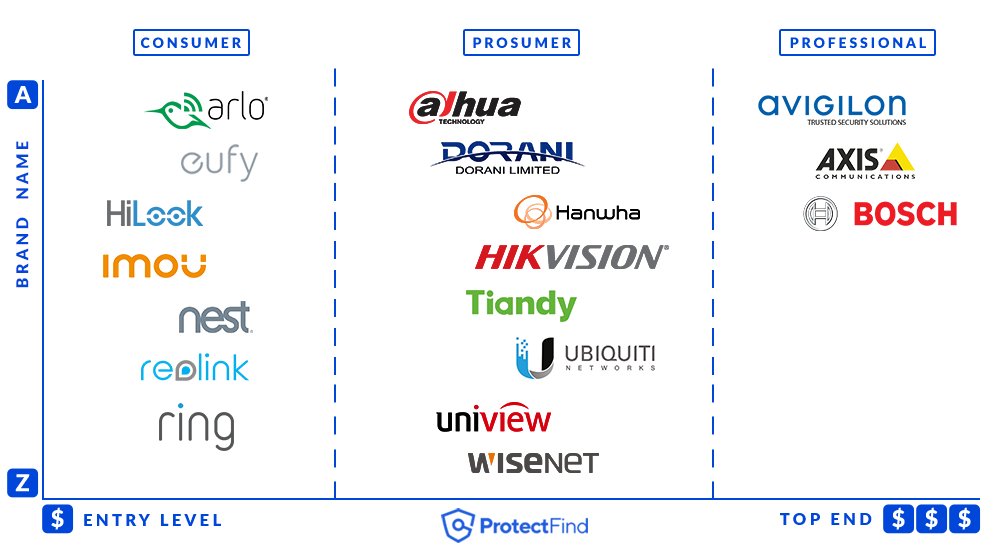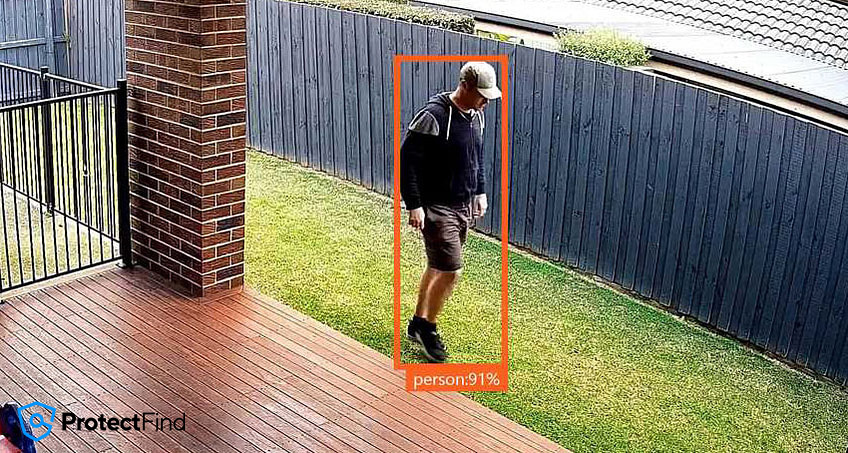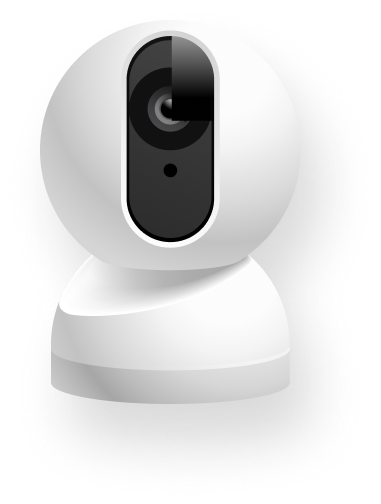Investing in a CCTV system for your home or business is smart, but figuring out how much it will cost can be tricky. Various factors influence the price, including the type of camera, recorder hardware, and the specifics of your property.
In this guide, we'll break down these factors to give you a clearer idea of what to expect when budgeting for a CCTV installation.
by Bryce Whitty
Bryce is a registered Security Advisor who started ProtectFind to help people get the right security system for their goals.
1
Camera Hardware
When it comes to CCTV systems, the cameras you choose play a significant role in the overall cost. Let's dive into the specifics of camera hardware and what influences their prices.
Type of Camera – Digital vs Analogue
CCTV cameras come in two main types: digital (IP) and analogue. Digital cameras are typically more expensive, costing around $150 more per camera than analogue ones. Despite the higher initial cost, digital cameras offer superior image quality, higher frame rates, and advanced features like Power over Ethernet (PoE) and video encryption.
Analogue cameras, while cheaper, often compromise on image quality and lack these advanced features.
Pro Tip:
If you're debating between digital and analogue cameras, we recommend opting for digital cameras. Due to their superior performance and capabilities, they offer better long-term value.
How Many Megapixels
The resolution of your cameras, measured in megapixels (MP), directly affects their price. Higher-resolution cameras, such as those with 6MP or 8MP, are more expensive and require more storage space for their recordings. This can also increase costs if you're paying for cloud storage.

Practical Advice:
For most domestic installations, cameras with 4MP to 6MP are sufficient. However, higher-resolution cameras are more appropriate for commercial properties that need to capture finer details. They offer enhanced zooming capabilities and better overall image quality.
Camera Features
Cameras come with a variety of features that can impact their cost. Key features to consider include:
- Low Light Technology: Cameras with advanced low-light technology, like Starlight, are more expensive than those with infrared (IR) technology. Starlight cameras use natural light to produce coloured images even in low light conditions.
- Lens Type: Fixed lens cameras are usually cheaper than varifocal ones, as they have a set field of view. Varifocal lenses, which can be manually or motorized adjusted, offer flexibility in adjusting the camera's view but at a higher cost.
Camera Brand
The brand of the camera also affects the price. Entry-level brands like HiLook offer reliable products at a lower cost. In contrast, premium brands like Hikvision provide more advanced features and higher quality at a higher price point. Other brands fall in between, offering various features and pricing options to meet different needs and budgets.

Number Of Cameras
The number of cameras required for your property will naturally influence the overall cost. More cameras mean higher hardware expenses and the need for a more advanced recorder with additional channels. Ensuring comprehensive property coverage without blind spots may require a mix of different camera types, further affecting the cost.
2
NVR or DVR Capabilities
The recorder, whether an NVR or DVR, is critical to your CCTV system. Its capabilities can significantly impact the overall cost of your installation.
NVRs (Network Video Recorders) and DVRs (Digital Video Recorders) serve the same basic purpose but are suited for different types of cameras.
NVRs are used with IP cameras, which are more advanced and expensive. In contrast, DVRs are used with analogue cameras, making them a cheaper option.
However, despite the lower cost of DVRs, the overall installation can be more expensive due to the additional materials and labour required for wiring each camera to the recorder. NVRs, on the other hand, use PoE to simplify the installation process and can support more cameras than the number of physical ports through the use of PoE switches.
We have an article comparing NVRs vs DVRs here.
Pro Tip:
If you're installing a new system, consider future-proofing with an NVR. It's more expensive upfront but offers greater flexibility and scalability.
Analytics
Advanced analytics can drive up the cost of your recorder. Intelligent Video Surveillance (IVS) and other sophisticated analytics require more processing power and are typically found in higher-end NVRs.
Brands like Hikvision and Dahua offer a range of analytics features at different price points.

Practical Advice:
To avoid being driven mad by false alerts, I would choose a solution with AI human detection rather than just basic motion detection. If you are a business, you might benefit from advanced features like facial recognition or object tracking.
Hard Drive Size
The amount of storage your system needs depends on your camera's resolution and how much footage you want to keep. Higher-resolution cameras generate larger files, requiring more storage space. For most domestic installations, a 2TB hard drive is sufficient for 4MP to 6MP systems, while an 8MP system might need 3-4TB.
The cost of larger hard drives can add up, so it's important to plan your storage needs carefully.
Use a video storage calculator to estimate your storage needs accurately. It's better to have more storage than run out when you need it most.
3
Install Location
The specifics of your property can significantly affect the cost of installing a CCTV system. Here are some key factors to consider:
Wall Material
The construction of your home or business can make a big difference in the ease of installation. Properties with non-standard builds, like full or double brick homes, or those with Hebel and foam construction, pose more challenges for concealing cables. These types of walls are harder to work with, increasing installation time and costs. In contrast, homes with larger wall cavities, such as brick veneer homes, are easier and cheaper to work with.
Pitched Roof vs Flat Roof
The type of roof on your property also affects installation complexity. Surprisingly, flat roofs are often more challenging due to the limited space for cabling. This can result in higher installation costs. Pitched roofs, with their ample space for cable placement, typically make for a quicker, easier, and cheaper installation process.
Is it a Multi-story or Large Property?
The size and height of your property can also influence installation costs. Large or multi-story homes may require more labour for optimal camera placement and field of view.
For instance, placing cameras on a multi-story home might require additional conduits to bring cameras to an appropriate height, which can affect labour and material costs.
Practical Advice:
Discuss the layout and size of your property with the installation team to get an accurate estimate. Complex properties often need more tailored solutions.
Distance between the NVR / DVR and the Cameras
The distance between your cameras and the recorder impacts the amount of cabling needed and the labour required for installation. Larger properties will naturally incur higher costs due to the greater cable lengths and more extensive labour involved. Proper planning of camera placement and recorder location can help optimize these costs.
Pro Tip:
Try to centralize your NVR/DVR location to minimize cabling distances. This can help reduce installation time and material costs.
4
Installation Costs
Now that we've covered the basics, let's get into the nitty-gritty—actual prices. Understanding the potential costs upfront can help you plan your budget more effectively.
These prices are based on a Prosumer-grade (professional consumer) level of quality, which is the starting point we recommend.
Prosumer-grade cameras start at around $1200 and go as high as about $4000 depending on how many megapixels and how many cameras you have.

We’ve gathered this information from multiple sources around Australia to give you a rough dollar value of what to expect.
2 Cameras | 4 Cameras | 8 Cameras | |
|---|---|---|---|
4 MP | $1200 - $2000 | ||
6 MP | $1200 - $1700 | $1600 - $2400 | $3100 - $5000 |
8 MP (4K) | $1700 - $2300 | $2400 - $3700 | $4200 - $5400 |
2 Cameras | 4 Cameras | 8 Cameras | |
|---|---|---|---|
4 MP | $1200 - $2000 | ||
6 MP | $1200 - $1700 | $1600 - $2400 | $3100 - $5000 |
8 MP (4K) | $1700 - $2300 | $2400 - $3700 | $4200 - $5400 |
Remember, prices can vary based on your location and specific needs, but this should give you a solid starting point.
5
Final Thoughts
Determining the cost of a CCTV system installation involves considering various factors, from the type and features of the cameras to the specifics of your property's construction and layout.
While it might be tempting to opt for cheaper or DIY solutions, professional installation ensures that your system is set up correctly and efficiently, providing long-term value and peace of mind.
When planning your CCTV installation, it is crucial to assess your needs and consult with professionals who can provide tailored advice and solutions.
This approach ensures you get the best performance and security coverage for your investment. Remember, while initial costs might seem high, a professionally installed CCTV system's enhanced security and peace of mind are invaluable.
Hopefully, that clears up some of your questions about CCTV camera installation costs. If you still have any additional questions, you can email us here, and I'll be happy to answer them.
